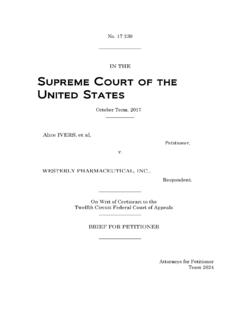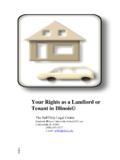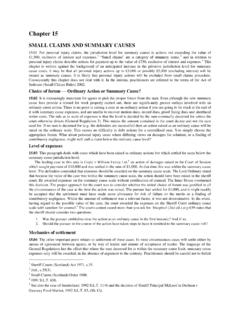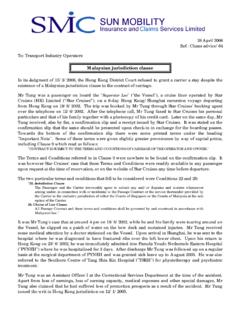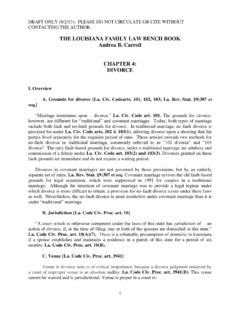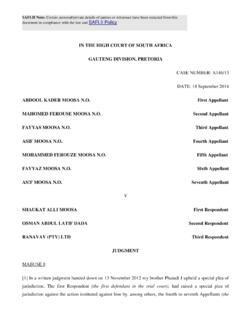Transcription of Your Rights as a Landlord or Tenant in Illinois©
1 Your Rights as a Landlord or Tenant in Illinois The Self Help Legal Center Southern Illinois University School Of Law Carbondale, IL 62901 (618) 453-3217 e-mail: TABLE OF CONTENTS Table of Contents Disclaimer Warning to all readers How to use this self help packet Who these people are Other options you may have Other publications What these legal terms mean Summary of the law in this area What is a lease? Commonly asked questions about Landlord / Tenant law Ways in which a Landlord can be in violation of a lease Ways in which a Tenant can be in violation of a lease Remedies that can and can't be used by a Landlord or Tenant The eviction process What you should do if you are being evicted The eviction hearing What happens if you win What happens if you lose How to file a document in a court file Disclaimer Please read This packet of information was prepared to answer general questions and give general advice about the law in Illinois.
2 This packet may or may not also include forms that you can use. When reading this packet or using the forms, keep in mind that the advice, information, and forms were created to assist readers with general issues, not specific situations, and as such does not replace the advice or representation of an attorney licensed to practice in the State of Illinois. Because of this and because of unanticipated changes in the law, the School of Law at Southern Illinois University and the person, institution, or agency who gave you this packet make no claim as to whether the use of this packet will acheive the result you desire and disclaim any responsibility for the consequences of any form prepared or action taken in reliance upon the information in this packet. If you are concerned or do not understand whether this packet will be of assistance to you or will apply to your specific situation, you should talk to an attorney who is licensed to practice in the State of Illinois.
3 If you have any questions about this disclaimer, call the Self Help Legal Center. Warning to all readers Before you proceed with using this packet, you should ask yourself the following questions: 1. Have I tried to consult a private attorney? No self-help publication, packet, or form can replace the advice and experience of a licensed attorney. An attorney may not cost as much as you think, especially if you just need to ask questions. Before you proceed on your own, call several local attorneys, compare prices, and find out whether you can pay an attorney or not. 2. If I cannot afford an attorney, have I tried to find a free source of legal assistance? There are several agencies which provide legal assistance for free to certain groups of individuals. Some of these agencies are listed below. While they may not be able to help you with a particular problem, it does not hurt to call them to find out before you proceed on your own.
4 3. Is this something that I can do on my own? If you have trouble following directions, or have difficulty reading, writing, or speaking in public, you may not be able to follow the directions and advice in this packet. If this is the case, find a friend or someone who can help you before you proceed on your own. Legal Service Providers Land Of Lincoln Legal Assistance Serves the 65 southernmost counties in Illinois Toll Free: 877-342-7891 For additional information, you may visit their website at Prairie State Legal Services Serves most of northern and north central Illinois outside of Cook County 815-965-2134 800-331-0617 Coordinated Advice and Referral Program for Legal Services Serving Cook County 312-738-9200 Will County Legal Assistance Serving Will County 815-727-5123 Free sources of legal help HOW TO USE THIS SELF HELP PACKET It is very important that you read each section of this packet completely before you take any action in regard to a legal problem including using any forms that supplement this packet.
5 Because this packet discusses terms and actions you are likely not familiar with, you will need to refer back to the following sections from time to time when reading this packet: People you should know This section describes people that you may come into contact with in regard to a particular legal problem. It is important that you understand who these people are and what they do and don't do. What these legal terms mean This section defines commonly used legal terms in words that you can understand. To use the rest of this packet and any supplemental forms, you need to understand exactly what these terms mean. Summary of the law in this area This section contains summaries of important areas of the law that you need to know. How to file a document in a court file This section answers commonly asked questions about filing documents.
6 Myths and Tips These two sections discuss commonly held misbeliefs about the law and steps that you should take (or not take) that could make your task easier. WHO THESE PEOPLE ARE Judge: The judge is the person who presides over the courtroom. In most cases, including eviction cases, the judge makes all of the final decisions and approves all agreements. When a judge makes a decision or a finding, it has the force of law. The judge also sets and enforces court rules (like dress codes) and in some courthouses, the judge decides when cases are scheduled. Circuit Clerk: The Circuit Clerk is responsible for creating, managing, and updating court files. When you want to put something in a court file, see a court file, or make a copy of something in a court file, you talk to the Circuit Clerk's staff. In some courthouses, the Circuit Clerk also decides when cases are scheduled.
7 Sheriff: The Sheriff's main duty is to keep the peace and to enforce the law. His/her role in the legal system, however, is usually to "serve" (give notice) to people that they are being sued. The sheriff does this by giving the person a notice called a "summons" . The sheriff also enforces the judge's orders. Attorney: An attorney is someone who can help you with your legal problem by providing you with advice about the law, the legal system, and the merits of your case. An attorney can act as your advocate and can represent you in court and in negotiation settlements. OTHER OPTIONS YOU MAY HAVE Mediation In some cases, you may be able to work out an agreement with your Landlord or Tenant as to what should be done about a particular situation or problem. A mediator is someone who can meet with you and the person with whom you are having a dispute and help you both come to a resolution you can both agree on.
8 A mediator is not a judge and does not make decisions, but rather helps you and the other person make a decision. In some counties, mediation is offered in certain types of cases, including Landlord / Tenant cases. Local or municipal law In some cities or municipalities, you may have additional Rights not mentioned in this packet. For more information on whether a local ordinance affects your situation you will probably need to consult an attorney. OTHER PUBLICATIONS ON Landlord / Tenant LAW Disclaimer: Please Read !! The following is a list of publications which discuss the issues of Landlord / Tenant relations. Some of these publications are specific to Illinois and others are more general in nature. Because of this and because of unanticipated changes in the law, the School of Law at Southern Illinois University and the person, institution, or agency who gave you this packet make no claim as to the accuracy of the content of these publications including whether they will acheive the result you desire.
9 The School of Law at Southern Illinois University and the person, institution, or agency who gave you this packet disclaim any responsibility for the consequences of any action taken in reliance upon the information in these publications. If you are concerned or do not understand whether a particular publication will be of assistance to you or will apply to your specific situation, you should talk to the publication's publisher or an attorney who is licensed to practice in the State of Illinois. If you have any questions about this disclaimer, call the Self Help Legal Center. Landlord / Tenant (pamphlet); Illinois State Bar Association [available at the Self Help Legal Center] You can also Search the SIU Law Library catalog for Self-Help Law Books, written for the nonlawyer. WHAT THESE LEGAL WORDS MEAN answer or response The written response to a complaint or a petition that is filed by the defendant (the person being sued) in a lawsuit.
10 In small claims court, you are not required to file an answer as long as you show up to the first scheduled hearing on the plaintiff's complaint. breach or "breaking" an agreement To do something that an agreement prohibits you from doing or failing to do something that you had agreed to do. circuit The judicial system in Illinois is divided into circuits. Each circuit defines a geographic area in Illinois. exemption Rights In Illinois, certain property (including cash, income, personal property, and a portion of your car and home) cannot be taken from you to pay a debt. This property is called exempt property. If a judgment is entered against you in Illinois, you have the right to claim this property as exempt and not use it to pay a debt against you. For a discussion of your Rights as a debtor, see the debtor s material on the Self Help Legal Center website.
